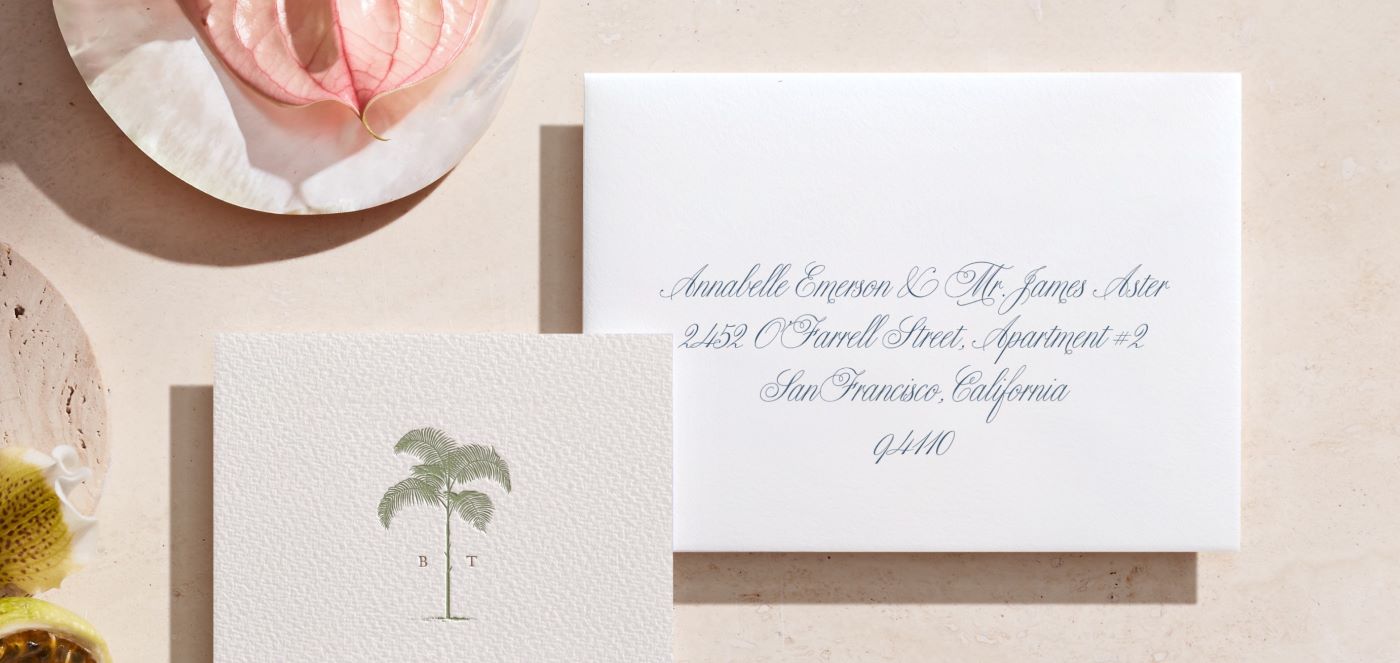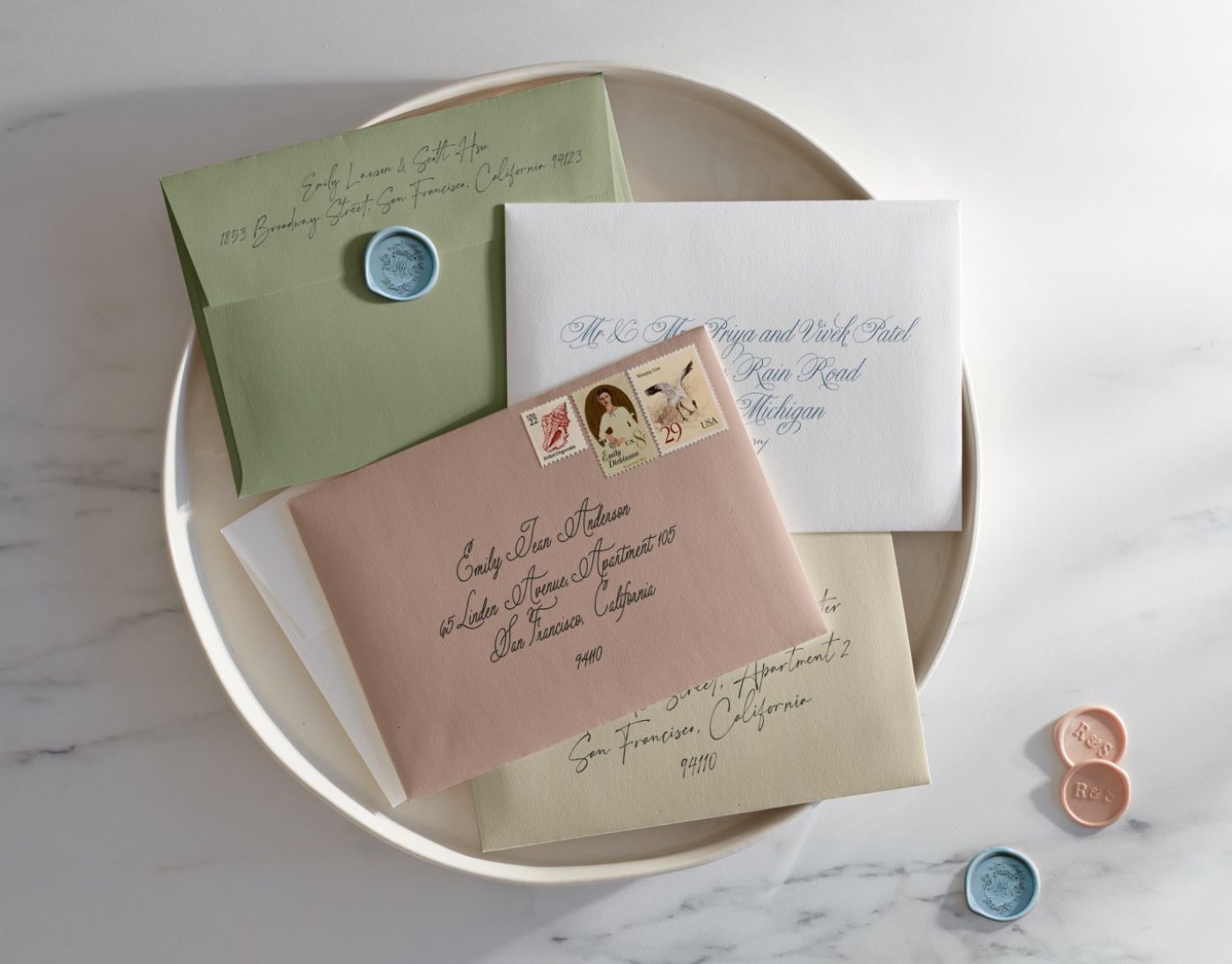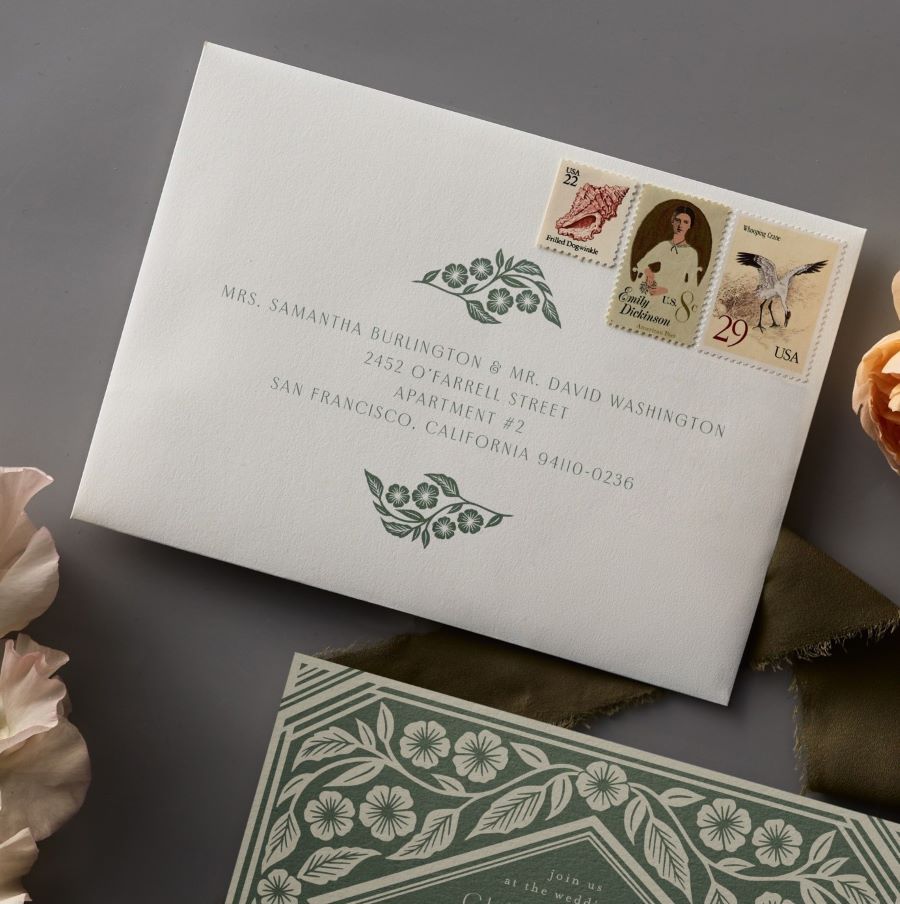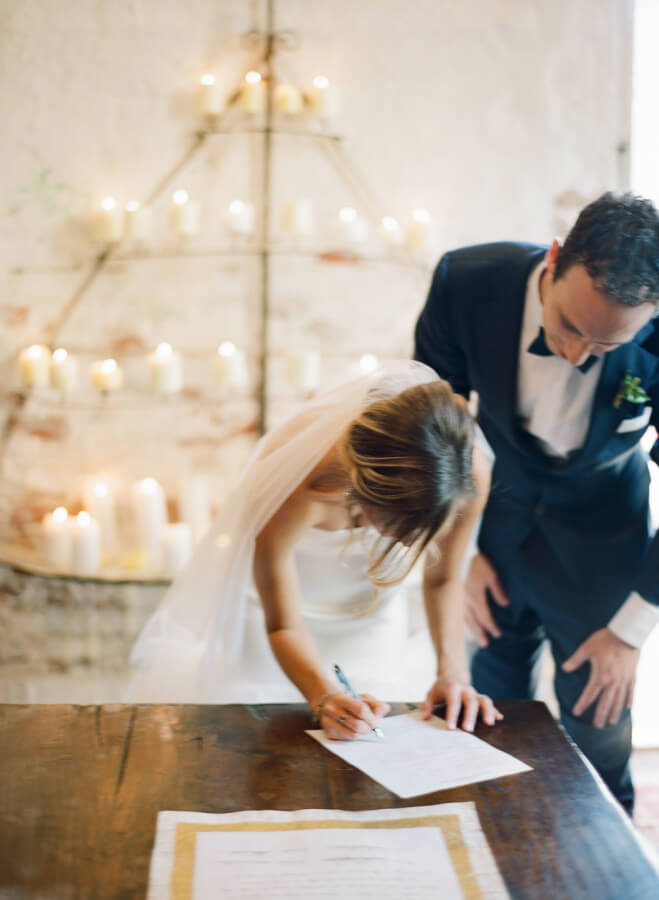When it comes to adding titles to your save the date envelopes, wedding invitation envelopes, place cards and more, men are easy: It’s always Mr., regardless of age or marital status. For women, on the other hand, titles are dependent on age, marital status, and more.
To clear up any confusion, we’ll explain everything below so you can address your wedding invitations perfectly.
WHAT’S THE DIFFERENCE BETWEEN MRS., MISS, MS., AND MX.?
MRS.
Mrs. is the title given to women that are or were at one time married.
MISS
Miss is the title given to unmarried and young women.
MS.
Ms. is used when you are unsure of a woman’s marital status. It can also be used for a single woman or a woman who was married but is now either divorced or separated. It’s pronounced “mizz.”
MX.
Mx. is a gender-neutral title that can be used for nonbinary guests or those who use they/them pronouns. It’s pronounced “mix.”
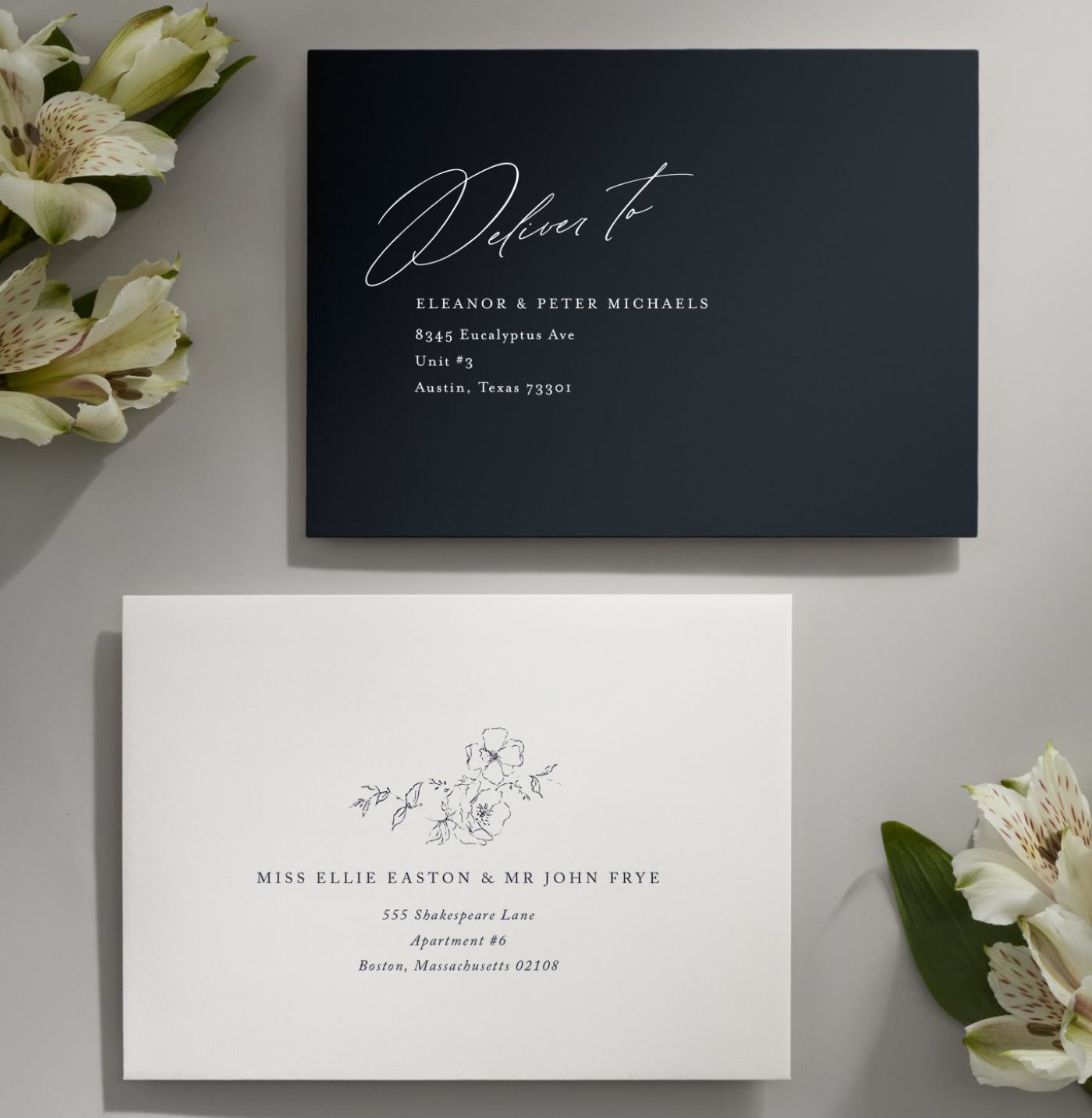
MISS VS. MS. VS. MRS. VS. MX.: HOW TO ADDRESS YOUR WEDDING INVITATIONS & SAVE THE DATES
MRS.
Mrs. is the proper title for a woman who was or is married, whether she has taken her spouse’s last name or not. If you know the woman is married, Mrs. is the way to go.
MISS
You can comfortably refer to girls under the age of 18 and young unmarried women as Miss. At a certain age, Miss can start to feel a little too young, and that’s where Ms. comes in.
MS.
Ms. doesn’t indicate marital status and is therefore a neutral, catch-all title. If you’re unsure whether a guest is married, or if a guest is divorced, Ms. is a safe bet.
MISS VS. MS. VS. MRS. CHEAT SHEET
Still confused? We made you a Mrs. vs. Miss vs. Ms. chart for every situation.
WHEN TO USE: |
MISS |
MS. |
MRS. |
Married |
✓ |
||
Unmarried |
✓ |
✓ |
|
Separated, not divorced* |
✓ |
✓ |
|
Divorced** |
✓ |
✓ |
|
Widow*** |
✓ |
||
Marital status unknown |
✓ |
||
Younger |
✓ |
✓ |
|
Older |
✓ |
ADDITIONAL TITLES TO KNOW WHEN ADDRESSING WEDDING INVITATIONS
Besides Mr. and Miss vs. Ms. vs. Mrs. vs. Mx., there are some additional titles you may need to use when addressing your wedding invites.
JUDGES
If you’re mailing a wedding invitation to a guest who is a judge, use the title “The Honorable” and list him or her first, followed by the name of their partner if they have one.
- The Honorable Sonya Patel and Mr. Niven Patel
DOCTORS
If a guest is a medical doctor or has a Ph.D., it’s appropriate to address the envelope using the title "Doctor.”
- Husband is a doctor, wife is not: Doctor Michael and Mrs. Sabrina Lee
- Wife is a doctor, husband is not: Doctor Sharon and Mr. Erik Sheffield
- Both partners are doctors: The Doctors Alfonso or Drs. Sonia and Carlos Alfonso
MILITARY PERSONNEL
For guests with military titles, spell out the titles in full. If both guests have military titles, then list the guest with the higher rank first. When addressing the wedding invitation envelope, indent the second line if both titles don't fit on one line.
- Captain Sarah Chao and Mr. Jason Chao
- Colonels Joanna and Marcus Gallary
LAWYERS
If you are inviting a guest who is an attorney, you do not need to use "Esquire" or "Esq." when addressing their wedding invitation.
MISS VS. MS. VS. MRS. FREQUENTLY ASKED QUESTIONS
Will I be "Ms." or "Mrs." after I get married?
It depends. Typically, brides who change their last name after the wedding go by Mrs. since it indicates they share the same last name as their husband (e.g., "Mr. and Mrs. Wong"). You can also go by Ms. if you'd prefer your title not to be associated with your marital status. If you're keeping your maiden name, you have options: You can go by Ms. or Mrs.
How do I address the envelope to two women who are married to each other?
When each member of the couple uses a different last name, use Ms. as their titles and list each name in alphabetical order by last name, as in "Ms. Kristin Hampton and Ms. Sarah Lee." However, if you know the couple prefers Mrs., use that title instead.
If both partners use the same last name, use Ms. as their titles and list each name in alphabetical order by first name, as in "Ms. Christine Azoveda and Ms. Stacey Azoveda." Again, if you know the couple prefers Mrs., then use that title instead.
When addressing envelopes, whose name should go first?
Traditionally, a woman’s name preceded a man’s on an envelope address, and his first and surname were not separated (Jane and John Kelly). Nowadays, either order is acceptable.
Do you use Mrs., Ms, or Miss if a guest is divorced?
After a divorce, if a woman keeps her married name, you can either use Mrs. or Ms. to address the guest followed by her first name and married name. If she is using her maiden name, then use Ms. along with her first name and maiden name. It’s always best to find out what she prefers to go by.
What if she's separated but not divorced?
If a guest is separated but not divorced, she is likely still using her married last name. If this is the case, then you can either use Mrs. or Ms. to address the guest. As always, though, it is best to find out what she prefers.
What if she's widowed?
Traditionally, a widow retains her husband's name until she remarries. Regardless, when addressing an invitation to her, you can use Mrs.
For more examples and guidance on correctly addressing your envelopes, visit our guide to Addressing Your Wedding Invitations. And if you haven’t designed your invites yet—but are ready to address them when the time comes!—request a sample kit to get started. Still have questions? Book a free consultation with a stationery expert.
We also have some other popular posts covering:



